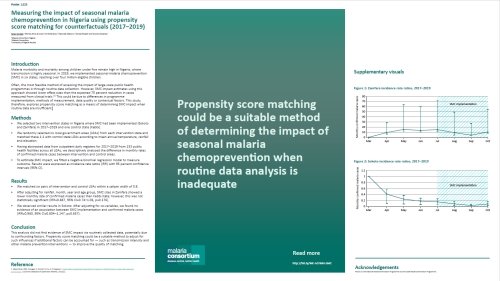
Publication Date:
18/11/2020
Author:
Taiwo Ibinaiye
Monica Anna de Cola
Sol Richardson
Olatunde Adesoro
Chinwe Nweze
Olusola Oresanya
Type:
Poster

Measuring the impact of seasonal malaria chemoprevention in Nigeria using propensity score matching for counterfactuals (2017–2019)
Publication Date:18/11/2020
Author:
Taiwo Ibinaiye
Monica Anna de Cola
Sol Richardson
Olatunde Adesoro
Chinwe Nweze
Olusola Oresanya
Type:
Poster
Propensity score matching could be a suitable method to determine the impact of SMC when routine data analysis is inadequate.
Malaria morbidity and mortality among children under five remain high in Nigeria, where transmission is highly seasonal. In 2019, we implemented seasonal malaria chemoprevenion (SMC) in six states, reaching over four million eligible children. Often, the most feasible method of assessing the impact of large-scale public health programmes is through routine data collection. However, SMC impact estimates using this approach showed lower effect sizes than the expected 75 percent reduction in cases measured from clinical trials. This could be due to differences in programme implementation, methods of measurement, data quality or contextual factors. This study explores propensity score matching as a means of determining SMC impact when routine data are insufficient.
This poster was presented at the 69th annual meeting of the American Society of Tropical Medicine and Hygiene.
Country: Nigeria
Keywords: Research | Malaria | SMC | SDGs
« Back to Publications